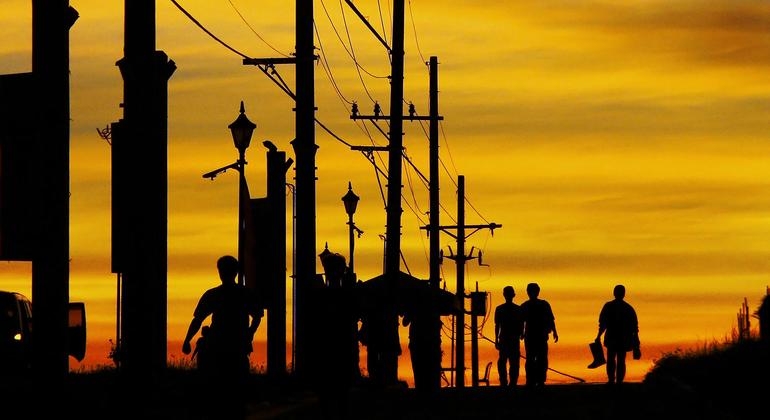Data from the UN’s World Meteorological Organization reveals this July is set to be the hottest month ever recorded.
Heatwaves not only threaten the environment but create additional obstacles for countries attempting to achieve sustainable economic growth, full and productive employment, and decent work for all, the targets of Sustainable Development Goal 8, according to the ILO’s Nicolas Maître.

Workers construct a road in Tajikistan.
How do you define heat stress at work, known as occupational heat stress?
Nicolas Maître: Occupational heat stress describes a situation where it’s too hard to work, or at least too hard to work at a normal intensity. It depends not only on temperature, but also on humidity and solar radiation. It endangers the safety and health of workers by increasing the risk of injuries and heat-related illnesses.

Haitian tailors work on a production line in a clothing plant.
At what temperature does heat stress start to occur?
Nicolas Maître: The estimates show that work productivity slows down at temperatures above 24-26 degrees Celsius (75-79 Fahrenheit). At 33-34°C (91-93°F), worker performance can drop up to 50 per cent in physically demanding jobs. It can occur in shade, and even inside some factories. If the factory has no air conditioning and employees are expected to operate heavy machinery or wear protective clothing, then it can occur in these contexts, too.
Broadly speaking, agriculture and construction are the most affected sectors. The ILO estimates that globally, productivity declines due to the impacts of climate change, with agriculture accounting for 60 per cent of this loss. But heat stress can occur in all physically demanding jobs that require employees to work directly under the sun, for long hours, or while wearing protective clothing.

A farmer waters her garden in north-central Burkina Faso.
Who is most affected by heat stress?
Nicolas Maître: It affects those with the least capacity for adaptation. It’s a matter of social justice, and it’s a matter of reducing inequalities among countries, as well as within countries.
Increasing the number of breaks, improving access to water, adapting working hours, and rotating workers are all effective heat-reducing measures. Adapting the clothing of workers, drinking regularly, and having routine self-health checks are also beneficial.

A domestic worker sweeps the street in an upscale neighbourhood in Delhi, India.
What can temperate countries learn from the adaption measures of hot countries?
Nicolas Maître: Evidence suggests that it’s becoming a real problem for temperate countries, but the problem is not the same. In Southeast Asia, for example, the problem is present year-round. In Europe, it’s a problem that primarily occurs during summer heat waves. I believe adaptation measures
should consider these differences. While we implement sustainable adaptation measures in hot countries, we might think of measures triggered by a specific temperature in temperate countries.

SDG Goal 8: Decent Work and Economic Growth
The role of the government in establishing these measures is very important. This relates to triggering situational adaption measures, but governments can also create a regulatory framework within the countries to tackle the issue of heat stress. It might be expensive, but the loss of productivity is also expensive.
UN: Why do you think heat stress has received so much media attention in recent years?
Nicolas Maître: When we started, there was very little research and media coverage was not the same. Now we see it’s all over the media. I think it is because it’s unavoidable, it’s here. We see our colleagues, our friends, and our families experiencing the issue.
For more information on the ILO report, click here.
This interview has been edited for clarity and length.


